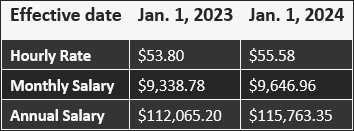In the ever-evolving landscape of business contracts, staying updated on the latest legal changes...
Wage and Hour Changes in California
Let's explore these legislative updates that affect wage and hour issues, whistleblower protections, and food handler card requirements.
California Overtime Exemption for Technology Employees (2024 Annual Announcement)
California Labor Code provisions offer an exemption from overtime requirements for certain computer software employees under specific conditions. One of these conditions is that the employee's hourly pay rate should not fall below the statutory threshold. The Department of Industrial Relations (DIR) annually adjusts this rate on October 1st, with the new rates taking effect on January 1st of the following year. The percentage increase in the California Consumer Price Index for Urban Wage Earners and Clerical Workers determines the adjustment.
In October 2023, the DIR increased the minimum hourly pay exemption for computer software employees, as indicated in the table below. This adjustment reflects a 3.3% rise in the California Consumer Price Index for Urban Wage Earners and Clerical Workers.

Fast Food Council: Health, Safety, Employment, and Minimum Wage (AB 1228)
Existing legislation established the Fast Food Council (Council) within the DIR and its powers until January 1, 2029, when it was suspended due to a referendum petition. This Council is responsible for setting minimum employment standards for fast food restaurants, including minimum wage rates.
Assembly Bill (AB) 1228 will repeal these provisions on January 1, 2024, provided a specified referendum is withdrawn by its proponents before that date. If the referendum is indeed withdrawn, AB 1228 will establish, until January 1, 2029, the Fast Food Council, outlining its purposes, duties, and limitations. It will also introduce an hourly minimum wage for fast-food restaurant employees, allowing the Council to adjust it within defined parameters. The bill further outlines requirements, limitations, and procedures for adopting and reviewing fast-food restaurants' health, safety, and employment standards. All standards developed by the Council will follow the Administrative Procedure Act, with the Council seeking input from relevant authorities if necessary.
AB 1228 also prohibits cities, counties, or city and county governments from enacting or enforcing ordinances or regulations setting wages or salaries for fast food restaurant employees, with specific exceptions.
Whistleblower Protections
Current law strictly forbids employers, or their representatives, from implementing rules or policies that prevent employees from reporting specified law violations to government or law enforcement agencies, irrespective of their job responsibilities. Employers found guilty of retaliating against such employees may face severe penalties and sanctions.
AB 1228 designates the Council as a governmental agency for whistleblower protection purposes. It also explicitly prohibits fast food restaurant operators from terminating or discriminating against employees who participate in or testify for Council-convened proceedings.
AB 1228 also imposes limitations on local governments, preventing them from passing ordinances or regulations related to fast-food restaurant employee wages and salaries, except in certain circumstances.
Food Handler Card Training and Examination Reimbursement (SB 476)
California's Retail Food Code governs health and sanitation standards for retail food facilities, enforced by the State Department of Public Health. Under this code, food handlers must obtain a food handler card within 30 days of employment and maintain it throughout their tenure. Obtaining this card requires successful completion of a training course and examination, with at least one such course costing no more than $15, including the card itself.
Violations of this requirement are generally considered misdemeanors. However, existing law exempts certain food handlers under local programs predating January 1, 2009.
Senate Bill (SB) 476 introduces several changes to this framework. It mandates that employers compensate employees for the time spent completing training and examinations, including any associated expenses. Employers must also release employees from other work duties while they undertake training. Furthermore, SB 476 prohibits making employment conditional on applicants or employees already possessing a food handler card.
These provisions apply to food handlers subject to existing local food handler programs in place before January 1, 2009.
In conclusion, staying up to date with California's employment legislation is vital for employers and employees. These recent changes, affecting overtime exemptions for computer employees, fast food employment standards, whistleblower protections, and food handler card requirements, significantly impact various aspects of the state's labor laws. Ensuring compliance with these updates is crucial for all parties involved in the employment landscape.
Want to learn more? Contact a TPG Payroll & HR Specialist today! Call 909.466.7876 now.
Also, should Enhancing Workplace Safety and Health Measures for the Upcoming Year be a priority for your business? Or, what should you know about the Reproductive Rights and Benefits for 2024? Find the answers to these and more questions by visiting our Blogs/resources page.



